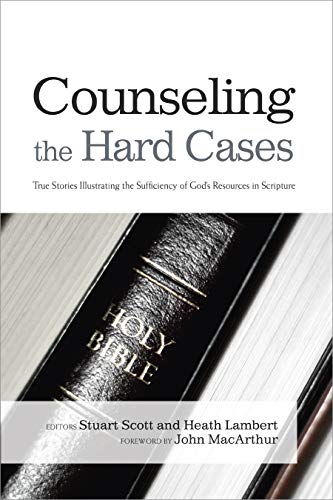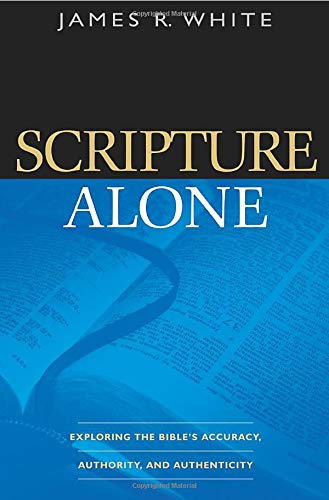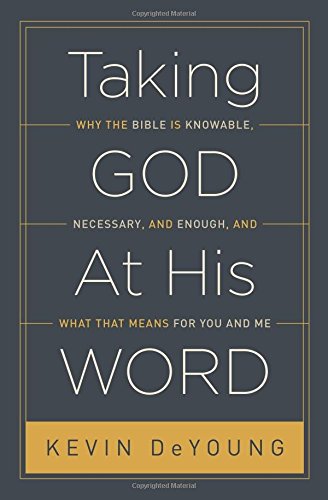Quotes about Bible-Sufficiency
Vainly do they run about with the pretext that they have demanded councils for the faith’s sake; for divine Scripture is sufficient above all things.
Some persons think they can know God by means of their own human reason. But reason is a blind ally spiritually. It has always been the great minds exercising their powers apart from the Word of God who have produced the great heresies. Some think they can discover God by listening to a so-called “inner voice.” But the voice is often nothing more than an expression of their own inner desires. Quite a few think that spiritual truths can be verified by supernatural events or miracles. But the Bible everywhere teaches that even miracles will not lead men and women to understand and receive God’s truth unless they themselves are illuminated by the Bible (see Luke 16:31). I believe that we can state categorically that there is no knowledge apart from Jesus Christ and that there is no knowledge of Jesus Christ apart from a knowledge of the Bible.
Inerrancy is not the most critical issue facing the church today. The most serious issue, I believe, is the Bible’s sufficiency.
The fanaticism which discards the Scripture, under the pretense of resorting to immediate revelations is subversive of every principle of Christianity. For when they boast extravagantly of the Spirit, the tendency is always to bury the Word of God so they may make room for their own falsehoods.
An understanding of the sufficiency of Scripture is the context in which we assert, maintain and practice the centrality of Scripture in the life of the church.
"God Told Me" and the Sufficiency of Scripture, ©9Marks. Website: www.9Marks.org. Email: [email protected]. Toll Free: (888) 543-1030.
The Bible contains the words of God and has great power. It is the primary tool that God uses to provide divine guidance and insight, convict sinners, change hearts, judge thoughts and attitudes, and train and equip Christians.
The sufficiency of Scripture means that Scripture contains all the words of God He intended His people to have at each stage of redemptive history, and that it now contains all the words of God we need for salvation, for trusting Him perfectly, and for obeying Him perfectly.
Systematic Theology, Zondervan, 1994, p. 127. Used by Permission.
Get this book!
1. The sufficiency of Scripture should encourage us as we try to discover what God would have us to think or to do. 2. The sufficiency of Scripture reminds us that we are to add nothing to Scripture, and that we are to consider no other writings of equal value to Scripture. 3. The sufficiency of Scripture also tells us that God does not require us to believe anything about Himself or His redemptive work that is not found in Scripture. 4. The sufficiency of Scripture shows us that no modern revelations from God are to be placed on a level equal to Scripture in authority. 5. With regard to living the Christian life, the sufficiency of Scripture reminds us that nothing is sin that is not forbidden by Scripture either explicitly or by implication. 6. The sufficiency of Scripture also tells us that nothing is required of us by God that is not commanded in Scripture either explicitly or by implication. 7. The sufficiency of Scripture reminds us that in our doctrinal and ethical teaching we should emphasize what Scripture emphasizes and be content with what God has told us in Scripture.
I have covenanted with my Lord that He should not send me visions or dreams or even angels. I am content with this gift of the Scriptures, which teaches and supplies all that is necessary, both for this life and that which is to come.
Preoccupied with mystical encounters and emotional ecstasies, [many] seek ongoing revelation from heaven – meaning that, for them, the Bible alone is simply not enough. [With them], biblical revelation must be supplemented with personal “words from God,” supposed impressions from the Holy Spirit, and other subjective religious experiences. That kind of thinking is an outright rejection of the authority and sufficiency of Scripture (2 Tim. 3:16–17). It is a recipe for far-reaching theological disaster.
How did the early Church ever function without the “expertise” we have today? Yet those Christians turned the world upside down (Acts 17:6), and they did it without any celebrity testimonies, without modern management techniques, without psychotherapy, without mass media, and without most of the means the contemporary church seems to view as essential. All they had was God’s Word and the power of His Spirit, but they knew that was sufficient.
Bible-Believing Doubters from Our Sufficiency in Christ, 1991, Crossway Books, a division of Good News Publishers, Wheaton Illinois 60187, www.crosswaybooks.org. p. 122.
Even though [the Bible] is an ancient document, every person in every situation in every society that’s ever existed can find in this book things that endure forever. Here’s a book that never needs another edition. It never needs to be edited, never has to be updated, is never out of date or obsolete. It speaks to us as pointedly and directly as it ever has to anyone in any century since it was written. It’s so pure that it lasts forever.
The pursuit of private, subjective interpretation effectively denies both the objectivity and rationality of God’s truth. It also denies the sufficiency of His inspired Word, presuming that there is no more we need to know than what God has placed in Scripture. In the end, this anti-intellectual search for truth often leads to the kind of chaos we see dominating the charismatic movement. For others, it leads to disappointment, despair, and apostasy.
[Sola Scriptura is defined as] the comprehensive and completed revelation of the will of God for us by which we can be thoroughly equipped for every good work… Such a complete, perfect, eternal, all-embracing, and all-sufficient revelation from God that it will never need amendment, correction, or supplementation.
God’s Word has always been His chosen instrument to create, convict, convert, and conform His people (Mark Dever and Paul Alexander).
The Four P’s, taken from The Deliberate Church, © 2005, Crossway Books, a division of Good News Publishers, Wheaton Illinois 60187, p. 33, www.crosswaybooks.org.
The sufficiency of Scripture means that we don’t need any more special revelation. We don’t need any more inspired, inerrant words. In the Bible God has given us, we have the perfect standard for judging all other knowledge. All other knowledge stands under the judgment of the Bible even when it serves the Bible.
Thoughts on the Sufficiency of Scripture, February 9, 2005. Used by permission. www.DesiringGod.org.
Whenever a man takes upon him to make additions to the Scriptures, he is likely to end with valuing his own additions above Scripture itself.
He doth not bid us take a taste of all sins and vanities, as Solomon did, to try them: for they are tried already; but that we should set the Word of God always before us like a rule, and believe nothing but that which it teacheth, love nothing but that which it prescribeth, hate nothing but that which it forbideth, do nothing but that which is commandeth, and then we try all things by the Word.
A Puritan Golden Treasury, compiled by I.D.E. Thomas, by permission of Banner of Truth, Carlisle, PA. 2000, p. 36.
This weapon is good at all points, good for defense and for attack, to guard our whole person or to strike through the joints and marrow of the foe. Like the seraph’s sword at Eden’s gate, it turns every way. You cannot be in a condition that the Word of God has not provided. The Word has as many faces and eyes as providence itself. You will find it unfailing in all periods of your life, in all circumstances, in all companies, in all trials, and under all difficulties. Were it fallible, it would be useless in emergencies, but its unerring truth renders it precious beyond all price to the soldiers of the cross.
The Bible and the Bible alone (Sola Scriptura) is sufficient to provide us with all truth essential for salvation. Whether explicitly or implicitly, everything necessary for faith and life can be found in Scripture.
Authority and Method in Theology, November 8, 2006, www.enjoyinggodministries.com. Used by Permission.
Sola Scriptura will bring about a revolution in your reading, studying, and living of Scripture. Knowing now the incredible life-changing resource that God has put into your hands, you will develop a specific plan to read and study the whole Bible through, listen to the Bible on tape, listen to sermons on tape, help your spouse and children read and study more, memorize God’s promises that help you escape the corruption of the world, pray through the Scriptures asking God for help in applying them, write specific applications that God wants you to do, meditate on special portions of God’s Word, remove those things from your life that quench your thirst for Scripture, and get involved in a church where God’s Word is faithfully taught as “the complete, perfect, all-embracing, and all-sufficient revelation from God that will never need amendment, correction, or supplementation.”
The Sufficiency of Scripture: By What Standard? April 3, 2003, www.visionforumministries.org, Used by Permission.
Embracing Sola Scriptura will radically alter your attitudes. It arouses profound gratitude to God for His rich supply to His children of “everything we need for life and godliness.” It inspires confidence in the Word of God as the complete, perfect, all-embracing, and all-sufficient revelation from God that it will never need amendment, correction, or supplementation. It begets humility regarding your own opinions and a deep suspicion toward your autonomous conscience and reason. It produces admiration and appreciation for the larger body of Christ in other times and places and the documents (creeds, confessions, catechisms, commentaries) which they have labored to leave for our understanding and benefit. And finally, it encourages submission to Scripture’s God who alone has ultimate authority in your life – the One who is in charge and who gets the final word.
The Sufficiency of Scripture: By What Standard? April 3, 2003, www.visionforumministries.org, Used by Permission.
Sola Scriptura makes is a transformation in your trust. Your conviction and confidence is no longer in psychology, social theory, corporate business models, or modern marketing techniques, but rather in the fully sufficient Word of God. For personal life, family life, church life – indeed, for ALL of life: vocational, political, community, etc. – the comprehensive principles, precepts, practices, and prudence of the Word of God is your safe and sure guide. No longer will you live life as a practical humanist, but rather you will approach all issues “epistemologically self-conscious” since there is no moral neutrality in the universe.
The Sufficiency of Scripture: By What Standard? April 3, 2003, www.visionforumministries.org, Used by Permission.
Those who have sidestepped (even inadvertently) the authority of a fully sufficient Bible have strayed in two opposite directions. The Roman Catholics, Eastern Orthodox, and authoritarian cults have wrongly given autonomy and final authority to the Church… At the other end of the spectrum are those who, in reaction to an authoritarian church, have skirted a fully sufficient Bible by giving autonomy and final authority to the individual’s conscience and reason. They assert that every believer has the unfettered right to interpret the Scriptures not only for himself but by himself. Interpretation, according to this view, is strictly an individual matter.
The Sufficiency of Scripture: By What Standard? April 3, 2003, www.visionforumministries.org, Used by Permission.
The Scripture is the library of the Holy Ghost; it is a pandect of divine knowledge, an exact model and platform of religion. The Scripture contains in it the credenda, “the things which we are to believe,” and the agenda, “the things which we are to practice.”
A Puritan Golden Treasury, compiled by I.D.E. Thomas, by permission of Banner of Truth, Carlisle, PA. 2000, p. 32.
The whole counsel of God, concerning all things necessary for His own glory, man’s salvation, faith and life, is either expressly set down in Scripture, or by good and necessary consequence may be deduced from Scripture: unto which nothing at any time is to be added, whether by new revelations of the Spirit, or traditions of men.
The Bible is a sufficient source of truth and direction for salvation and for all significant aspects of life. A person should not search the Scriptures in hopes of learning the best way to poach an egg or repair an automobile. But when it comes to issues of sin, salvation, the church, the worship of God, evangelism, marriage, the education and discipline of children, relating to an immoral society, or any other aspect of Christian living, the Bible stands alone as sufficient. God’s Word does not need to be supplemented by human wisdom, ingenuity, philosophy, or psychology.
The Bible is God’s Special Revelation, Christian Communicators Worldwide, www.CCWtoday.org. Used by Permission.
Recommended Books





















